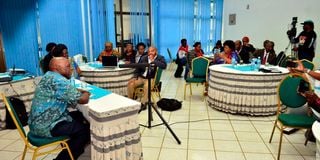At 80, Austin Bukenya keeps the intellectual spirit alive

Prof Austin Bukenya conducts a literary workshop for guests in Nairobi on August 31, 2018.
The cliché that age is nothing but a number best describes Austin Bukenya. For, Mwalimu Bukenya not only appears younger in look but is also probably East Africa’s most publicly engaged scholar.
In a region where most scholars of his age have no time, opportunity or interest to publicly speak about issues that affect their communities, Mwalimu Bukenya has kept his keyboard very active. His contribution to debates on these very pages puts to shame too many of his peers and even younger scholars.
At 80, Bukenya’s name rings loud in the ears of his students and readers. His students of the past will remember him for his theater and poetry. His students of today will remember him for his undying interest in mentoring younger writers and activism.
Bukenya will easily travel from Kampala to Nairobi to attend and speak at a four-hour Writing Workshop hosted by Amka Women’s Writing Space at the Goethe-Institut without a complaint. Very few of his age mates with such name recognition would even bother to answer a request to attend such an ordinary event.
There are no big name writers at Amka. Most attendees at the workshop are young writers – women and men – who are trying out a few lines or poetry and prose; hoping for a comment or two that might set them on the path to literary greatness. It is these young people that Bukenya mentors.
But it is Mwalimu’s role as a public intellectual that needs to be celebrated as he celebrates eight decades of life. As a poet, novelist and playwright, Bukenya is widely known in East Africa and beyond. His writing is studied in literature, culture and performing arts classes. His novel, The People’s Bachelor and his plays, The Bride and A Hole in the Sky have seen him read in literature classes from the 1970s to date. The last play dramatises the tragedy of environmental destruction or the effects of climate change, as it is fashionably known these days. This play is a pithy warning to humanity to change its ways or face the consequences of damage to the environment.
For someone who grew up at a time when African writers and literary critics were asking difficult questions about their role in the society, Bukenya’s writing has always demonstrated what is seemingly a personal concern about the lives of his people. But who are Bukenya’s people? One doubts that Bukenya would say that his people are Baganda or Ugandans. Or are they Tanzanians, where he studied? Is it Kenya where he lived and taught for many years? Is it fellow writers? Is it feminists? Is it oral artists?
If one remembers his novel, The People’s Bachelor, one would recall that the author appeared very cynical about the value of university education to a majority of Africans. The satire of the novel clearly made sense then – and some would say even today – because in the immediate postcolonial moment, the educated African appeared to be detached from ‘his or her’ own people. Western education had alienated the African from his or her native education and traditions, naturally so.
The ‘newly’ educated African was not just a product of a foreign system of thought, she or he was expected to think, live and act in a manner that aped the alien ways. It is not surprising that many educated Africans would be depicted as aliens in the writing of the likes of Bukenya who probably suffered from the tension between the world of their childhood and the one that education bequeathed them. For readers of Okot p’Bitek's Song of Ocol and Song of Lawino and Ngugi’s The River Between, among other early East African writers, this catastrophic reality and characters would inevitably appear in their works for a long time.
It is not surprising that writers such as Bukenya would, therefore, almost naturally adopt the role of the writer or critic as a public teacher, and later a public intellectual. Old teachers don’t really retire. They just recreate the classroom or school in new spaces. Old teachers see the world and people around them as a different place and pupils from the more familiar ones of the school, which would allow them to continue teaching. A public intellectual gains her or his authority from this connection between her or him and the ever-changing world and opportunities they create to reflect and teach and learn.
A public intellectual tests the limits of their thinking – and that of the society in which they live – on issues that are pertinent to the everyday lives of her or his people, be they near or far. These issues need not be of concern only to the majority; they can be what makes the lives of the minority unbearable or even enjoyable. Does it surprise anyone who has read Bukenya’s column in Saturday Nation over the years that Mwalimu would easily write on the significance of Kiswahili for the East African community or effortlessly celebrate African feminism (by declaring himself a feminist) or memorialize the life of a fallen African literary or cultural hero!
A public intellectual doesn’t just speak to those that she or he is familiar with. They speak to the known audience and the one they don’t know because either their words will be spread by those they address directly or they will provoke more debate in the worlds and lives of those who are not close to them.
Ugandans, Kenyans and Tanzanians have been Bukenya’s public pupils for many years, reading him in the newspapers, listening to him on radio or at public events. But today, that audience has expanded to include South Sudan, the DRC, Burundi, Rwanda and Somalia. This is Bukenya’s stage, on which he can perform orature, dramatise his Kiswahili culture or proselytize about the utu that connects the people of the region, beyond trade and politics.
Bukenya may have appeared to reject the thinking and practices of the university of the old days. But he spent several of his 80 years on earth in universities all over the world, probably refashioning the university, and consequently ‘re-creating’ his own ideal university in the world beyond the ivory tower of academia. It is worth celebrating Bukenya’s quintessential bridging of the world of academics and nonacademics as he turns 80.
- Tom Odhiambo teaches literature at the University of Nairobi. [email protected]





